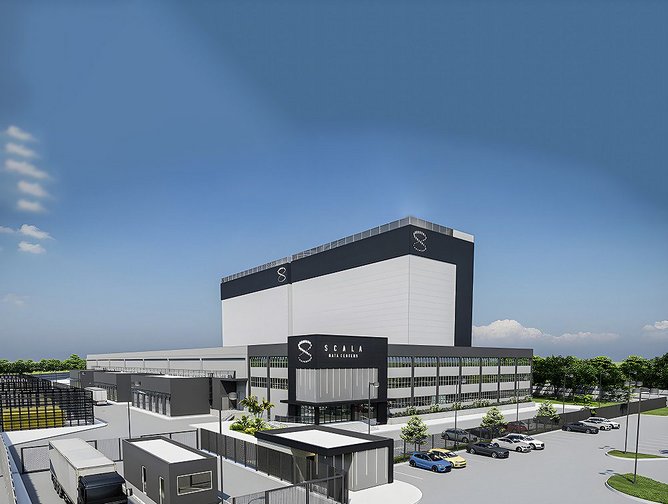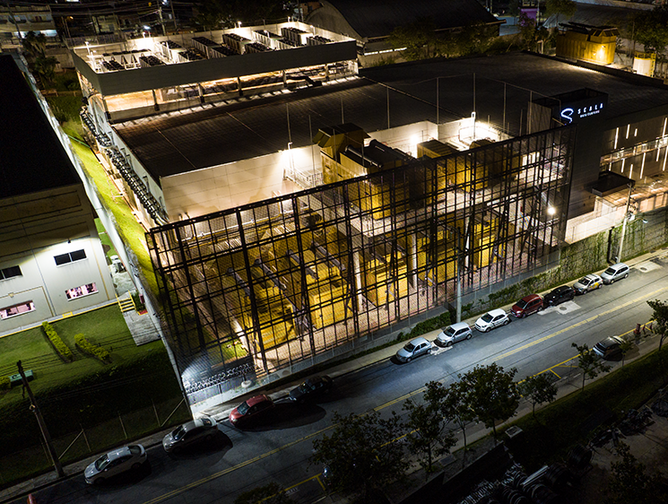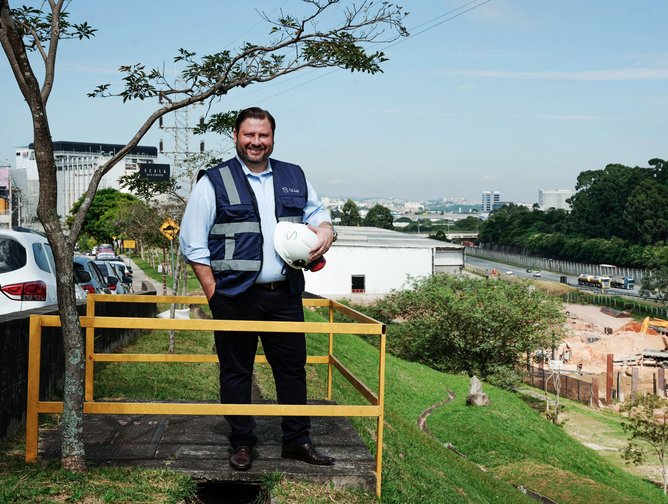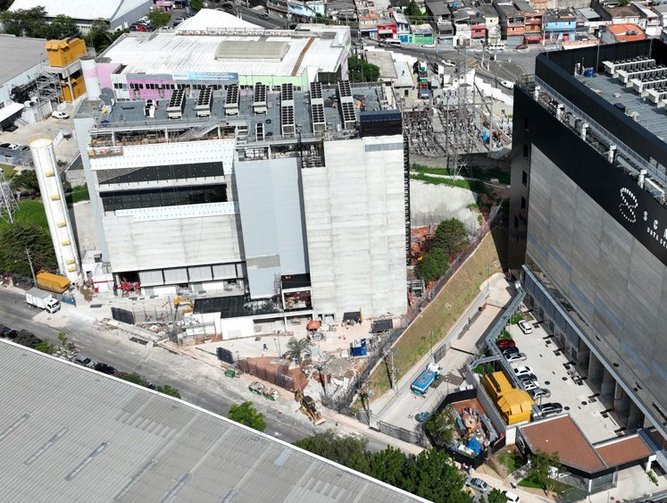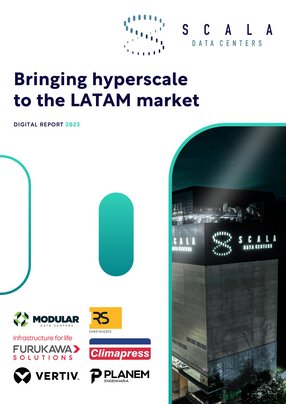Scala Data Centers: Bringing hyperscale to the LATAM market
Scala shifts the paradigm in the Latin American data centre industry by growing at real scale.
The factors that instantly set Scala Data Centers apart from its competitors are the phenomenal pace of its growth, the size of the sites that it is deploying and the extraordinary degree of its customer-centric approach. Although this would be an impressive feat in any of the global data centre markets, what’s particularly remarkable is that this is being achieved in one of the most notoriously underserved data centre markets: LATAM.
Scala is scaling at real scale and, in less than three years, has grown from its starting point of 17MW in bookings to 150MW, possessing the 4th largest data centre campus in the world – the largest in Latin America by a considerable margin – and managing a team that has grown from 32 to more than 700 employees in this short period.
In an exclusive interview with Marcos Peigo, Co-Founder and CEO of Scala Data Centers, we find out more about the factors driving this growth and the DC provider’s ambitions for the next decades.
A late market entrance, spurring new growth mindset
Interestingly, Peigo explains that one of the principal reasons behind Scala’s trademark approach to growth is the fact that the provider came to the data centre market relatively late in the game.
“When we arrived, our competitors were already established, with a fragmented capacity distributed among the LATAM countries. So, we decided to invest not in shared facilities, but in single tenant facilities foreseeing an expansion in the demand similar to what has happened in other more developed markets,” Peigo explains.
“Instead of starting by building one data centre and sharing space in that facility for customer A, B, C and D until 70-80% of that data centre is already occupied before launching a new one, we started another approach, which was specifically designed to meet the needs of hyperscale customers. We decided to get the same four customers, and create one building for customer A, one building for customer B, one building for customer C, and one building for customer D, with reserved space for them to grow.”
In the LATAM market, besides the advance of digital transformation, key drivers of growth here are the power restrictions that are currently being experienced in North America that used to serve our region, data sovereignty regulations and currency instability concerns. Consequently, catering for this demand then shifts to the Latin American region.
In recent years, this long-standing trend was coupled with the shift brought about by the COVID-19 pandemic, during which Scala experienced a dramatic increase in demand, fuelled by the world’s pivot to cloud technologies and companies’ rising reliance on data.
“When the demand spiked, these customers triggered the reserved space and asked for more reservations within the same campuses. So, we placed our bets on building at scale, dedicating spaces for our customers for significant growth – much bigger than that which they had experienced in Latin America in the previous years – all within large, customised, and dedicated buildings,” Peigo outlines.
“When they sign an agreement with us, our customers have secured an avenue to grow for decades. We assume a strong long-term expansion capacity commitment while giving them the comfort of growing in the same location with a trusted partner obsessed with their success.”
From there, the average size of Scala’s tickets jumped from 2MW to 8MW, then 8MW to 20MW, and so on, as Scala and its customers alike saw returns from their investments in these large deployments.
“The combination of these factors – alongside our massive control from design to construction with sustainability practices, all developed by our own team – and this long-term view, which sees us betting on our customers’ growth, has taken us to this position where we are basically doubling the size of the LATAM market in three years.”
Now, Scala plans on opening 12 sites within the next 24 months – a testament to the quality of its engineering and construction teams. This is even more impressive when you consider that the young company started out (just a few years ago) with two sites. For Peigo, Scala’s unique relationship with its partners has proved absolutely instrumental in achieving this.
“To work with DigitalBridge is really a pleasure. DigitalBridge brings us a unique combination of global experience with Scala’s local knowledge. So, we don't see DigitalBridge as single investors – they are also operators,” Peigo explains.
“I see the DigitalBridge team much more as an extension of the companies they invest in, rather than investors that we meet in board meetings to talk about results and define targets. It's more a day-by-day relationship with strong alignment,” Peigo posits.
Similarly, the bespoke partnership that Scala has established with Brazilian company Modular Data Centers has been key to achieving a faster pace of customer-centric service that has defined its success.
“Modular had all-in-one prefab outdoor modules. They sell to the market, in general, smaller deployments, at 8, 16 or 30 racks. But, based on the idea of enhancing the amount of components that we could prefab before sending to the site – so that we could achieve higher standardisation and need less time to deploy – Modular took on the challenge to build something bespoke for Scala and together we came up with the FastDeploy design where dedicated blocks of 600kW of capacity can be delivered on record time in strategically located sites that can grow up to 7.2MW of IT capacity.”
Walking the talk on sustainability since day one
Since much of what Scala does in this region is the first of its kind, a key part of its sustainability strategy is working with local people and communities.
“We have to work with municipalities and local governments to educate them about what a data centre is and the benefits that a data centre deployment can bring. In this way, we’re working also to enable tier two markets in Latin America, bringing progress to these countries and locations, and enabling the future in Latin America,” Peigo asserts.
“We really believe that digital infrastructure is the way to pave the future for these countries and to enable growth in a sustainable manner. This isn’t something that happens in one meeting or with one press release; this is a process, and it takes time to consolidate.”
Scala believes that infrastructure and education contribute massively to transforming society and guided by this belief, since 2020, Scala has donated full engineering scholarships to young people in situations of social vulnerability.
“In November 2022, we expanded the programme announcing that from now on, for every MW booked, we will donate a full engineering scholarship in the area where that capacity will be deployed, plus a dedicated mentoring program with a Scala executive plus a job opportunity at the company”, Peigo asserts. “Therefore, millions of opportunities in someone's life will be created, enabling a brighter future for them and their families. In 2023 we will reach 150 full engineering scholarships.”
Alongside this, Scala has firmly asserted itself as a market leader in the field of green standards.
“What makes us really proud is that, since the beginning, sustainability has been a must. This means huge investments to drive lower PUEs, only renewable sourcing since our first day of operation, and being the first Latin American data centre to reach a carbon neutrality status, plus the first to operate with 100% renewable sources in the region.”
“The average PUE for data centres in Latin America is 1.74. Our average PUE in loaded sites today is under 1.35 and, in our most recent designs, we are already reaching below 1.30. We’re very proud to be leading the industry in our region in this way being the benchmark to be followed.”
Creating LATAM’s hyperscale market
Currently, Scala’s key availability zones in Brazil can be seen as a triangle of its vast Tamboré, Jundiaí and Campinas campuses. Then, running in parallel to these expansions, it is also rapidly developing its presence in other cities in Brazil – Rio de Janeiro and Porto Alegre – and also in other LATAM countries, including Colombia, Mexico and Chile.
What makes Scala so successful in this emerging market is the strategic positioning of its data centres, in order to create opportunistic availability zones, which are precisely designed to best serve customers.
Scala’s ascent to the top of the LATAM DC market began in Brazil, upon the acquisition of two premium data centres from the UOL Group.
“We quickly decided to grow, with the idea of big campuses in LATAM mirroring the US markets. Seeing this growth combined with the maturity of the applications, the constraints of power and growth in North America, plus the demand for lower latency deployments in Latin America, we drive for bigger deployments,” Peigo explains.
“Before 2020, the average deployments in Latin America (for a hyperscale site) were 2-3MW. Now, we’re talking about 20-30MW buildings dedicated to single hyperscale customers, not only in Brazil but also in other countries.”
In fact, Scala is currently deploying its Lampa campus which is already the biggest campus ever permitted in Chile, with 120MW of total capacity and 90MW of IT capacity when fully deployed.
“And to give you a sense of how big we plan for some locations to be, for our Tamboré campus alone, we have secured 600MW of power, which makes Tamboré the fourth largest campus in the world, and by far the biggest one in the entire LATAM market,” Peigo says.
“We already have 100MW in production, and we are now adding a second substation with another 100MW and the third substation will be 400MW. It's a massive amount of capacity. To give some perspective on this, the consumption in Tamboré alone will be the same size as the consumption required for the entirety of Brasília.”
The pace of Scala’s growth – particularly in 2022 and 2023 – is massive. But why? Beyond simply a case of profit for profit’s sake, why has the speed of growth been set as such a paramount priority for the provider?
“Firstly, we understood from the beginning that this hyperscale market didn't exist in LATAM. We had hyperscale customers with capacity deployed in LATAM, but all of their capacity or all of their loads were relatively small, with one megawatt here, two megawatts there, and so on.”
“Add to this equation that the majority of the existing DC’s in the region were smaller in average size than a single data hall of a real hyperscale facility. Of course, they were built in an era where the capacity and the visibility for the future was very small, but that does not change the fact those structures were not ready for the current demand. Plus, they were designed without the sustainable requirements that we have today.”
Peigo explains that, very early on, Scala realised the hyperscale expertise on engineering, design and sustainability for data centres were practically non-existent in LATAM. Then, they instead decided to invest in creating this expertise from the ground up.
“So, we hired a lot of people and built our Center of Excellence in Engineering (CoE), from which we control everything from the design up to construction management.”
The Center of Excellence gives Scala a far greater degree of control in the design, construction management, planning and performance evaluation of its data centres. Rather than using general contractors, the centre gives the company centralised control, helping it to implement a streamlined, uniform approach across its entire Latin American portfolio.
“Instead of having branches of Scala, we have uniform sites. So, if you’re working for Scala in a data centre – whether it’s in Colombia or Rio – it's the same local structure, supported by our centralised command centre. We basically change the address.”
This approach is not only fostering efficiencies across the entire portfolio, but this approach is a cornerstone of Scala’s company culture.
“We are not creating the sense that Brazil is the biggest country and the centre of our portfolio – Scala is a Latin American platform.
“With the non-Brazilian employees that we have hired, we bring them to the headquarters, and they stay with us for three to six months, working and getting trained in the common centre. Then, when they get back to their countries, they’ve left a piece of their country here and they take a piece of Scala there. This forges our culture and strengthens the bonds among our people, it doesn’t matter where they live or work.
“This is the way we are growing as a unique company: a single entity, operating all of these campuses in a sustainable way throughout Latin America.”
